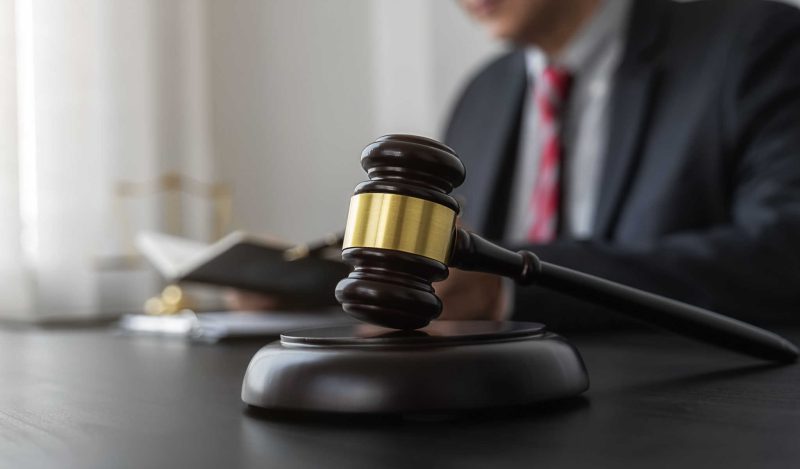Tracy Beanz is a reporter with Uncover DC who has been carefully following our Missouri v. Biden case. She just published a detailed Twitter thread with updates on our petition for a preliminary injunction. With her permission, I’m publishing a lightly edited version of her coverage here.
I’m happy to report that things appeared to go very well for us in court this week, as you will see below. We are hopeful that the judge will grant the requested injunction. This will be the first major step in dismantling the government’s vast, unconstitutional censorship regime.
Many of you have heard me discuss this case in detail, as I have been reporting on it diligently for the past year. However, some of you are unsure of why it is important, or what it all means. This thread will serve as a summary to this point, and a detailed explanation of the last filing in the case which is a virtual handbook to government censorship based on the limited discovery provided so far.
Missouri v. Biden was filed on May 5, 2022. Since it was initially filed, it has taken quite a trip through the court system. The complaint has been amended three times, with the most recent amendment being to transform the case into a class suit—this due to the overwhelming evidence of broad harm to the constitutional rights of all Americans. You can view the docket by using the link here.
The complaint alleged that the US Government was not only threatening and coercing social media companies to censor Americans on social media, but they were also working with social media companies to accomplish that goal. It alleged that topics surrounding covid, the origins of covid, the Great Barrington Declaration, election integrity concerns, the covid shot, the Hunter Biden laptop story (and more) were under scrutiny by the White House and other government agencies—and that the government had very publicly threatened to take action against social media companies should they not act to censor viewpoints on those topics that were disfavored by the government.
The Plaintiffs in the case (the states of Missouri and Louisiana, along with several other private plaintiffs, including Aaron Kheriaty, Jay Bhattacharya, and Martin Kulldorff) moved for expedited discovery to be able to obtain a limited set of evidence as well as depositions of certain officials. This evidence, they argued, would allow them to make the case for a temporary injunction to stop the government from infringing on the First Amendment rights of Plaintiffs and their citizens.
Unlike what many have come to expect, the judge GRANTED the motion for expedited discovery and depositions. A struggle ensued between the Government and Plaintiffs, with the government fighting against the judge in this case (Judge Terry Doughty) to stop discovery and certain plaintiffs from being deposed. They took those complaints to the 5th Circuit Court of Appeals and a court in Virginia—a court that *usually* is friendly to the government.
At the appellate court level, the government argued really that NO ONE should have to leave their government jobs to sit for long depositions in this case, but certainly not the head of CISA, for example [the Cybersecurity Infrastructure Security Agency, part of the Department of Homeland Security that now coordinates the censorship-industrial complex]. The appellate court wouldn’t play ball with the government, and remanded the case back to Louisiana with some guidance on how the judge should proceed. If memory serves me right this happened three times.
One particularly interesting exchange came with the deposition of former White House Press Secretary Jen Psaki. She made threats to social media companies from the podium. They sought to depose her about those threats. She left the office. The government said they had no responsive documents to explain her comments. So Missouri and Louisiana said, “Then we have to depose Jen Psaki”. The court agreed and ruled that now private citizen Psaki needed to testify. The government and Psaki—represented by Rhee—went to a court in Virginia to try to get that judge to stop the deposition. The judge in that case laid into both the government and Psaki. It was so stunning I literally read the transcript of the hearing in this video.
This went back to Louisiana after the Virginia judge essentially said “You won’t like how I rule on this and your argument is terrible so I’m sending it back to the judge who should be making this decision.” The judge in Louisiana again decided Psaki should be deposed if the government didn’t have any responsive docs from the press office. Somehow, those documents must’ve appeared because she still has not been deposed.
Aside from this, all along the way the government has lost—over and over again. They were also caught hiding discovery materials—the judge rapped them and ordered them to produce or else—which they did. And then came the government’s motion to dismiss, which the government had once withdrawn and then refilled. The judge ruled against the government and said the case will continue. He also reminded the government that this was limited discovery—and that discovery will widen significantly once the actual trial gets underway.
Another interesting tidbit: once Fauci was deposed the government sought to seal all depositions and video—along with discovery materials arguing that the government “employees” were being threatened and harassed and faced imminent harm. But they couldn’t produce any examples of that happening. The judge ruled against sealing anything except personal information like addresses.
So far I’ve only really discussed the procedural happenings—however what limited expedited discovery in this case has exposed (separate and apart from the Twitter files) is both unprecedented and abhorrent. The most widespread and troubling discovery? CISA has designated YOUR THOUGHTS part of the governments infrastructure. They call it “cognitive infrastructure.”
They argue that they can regulate what you think as they consider it under their purview. In this article I describe “The 6 Most Shocking Recent Revelations of Government Censorship,” if you want the details. One character of particular importance was White House director of digital communications and strategy Rob Flaherty. Flaherty was ABUSIVE to social media companies—like they were his battered wife. Many of them resisted the calls for censorship until threats forced them into action. I was actually stunned to see how averse they were to censoring—until forced to by the government.
Recently the Plaintiffs filed their motion in support of the temporary injunction—a hearing we have been waiting on for nearly a year because of the governments delays and obfuscations. It included 1,200 FACTS about government coordinated censorship. The government responded with a 1,200 page monstrosity plainly arguing they did it all—but because of foreign actors and the “safety” of the American people—lest we be exposed to harmful “misinformation.” Then they asked the judge to give them another week and postpone this hearing—again, arguing they wouldn’t have time to digest Plaintiffs response to their last filing.
The judge told them he wouldn’t be postponing this hearing again. A few days ago Plaintiffs filed their response—and it really is an encyclopedia of their expedited and limited discovery so far. I will comment on it in detail below. But first I want to explain why this case is NOT like any other we have seen.
The judge has done the right thing the entire time. The appeals court has done the right thing the entire time. The depositions were granted, the discovery was granted, the motion to dismiss was denied—the judge has expressed several times his shock at what the plaintiffs have exposed. The judge plays by the rules and both he and the appellate court are significantly alarmed by what has come out. This isn’t what we are used to; namely, a weak judge capitulating to the government. In fact, the judge hasn’t capitulated ONCE. Neither has the appellate court and neither has a DC court.
What is the remedy sought by the plaintiffs? Well, if the temporary injunction is granted (I am nearly certain it will be) the remedy is to bar the government from working with social media companies to flag and censor posts. They will also be barred from working through NGO’s to do the same. (Here’s looking at you, Election Integrity Partnership and Stanford internet observatory and Atlantic Council)—no FBI task force inside Facebook or Twitter, no emails back and forth about “vaccine misinfo” and how to stop it. The government has to CEASE all of this unlawful behavior.
What will follow is going to be a relatively detailed breakdown of the latest filing from the plaintiffs—an answer to the governments excuses for why:
- What they did isn’t really censorship (mainly that they didn’t *force* the social media companies to take action).
- Why what they did is “OK.” The guise of national security and “safety” and protecting Americans from “Mis, Dis, and Malinformation”.
Share this with everyone you know. Yes, it’s that important. Here is the link to the filing I will be detailing.
Plaintiffs begin with a hypothetical, and they do this because the government tried to make all of this behavior “OK” by claiming that the Trump administration did the same thing. That is an exercise in futility—the Plaintiff’s don’t care what administration did it, only that it happened, and besides, the Trump White House directed NONE of this activity. As an added zing (in my opinion): they used book burning as their hypothetical—this appeals directly to the left angry that we don’t want pornographic books in kids libraries.
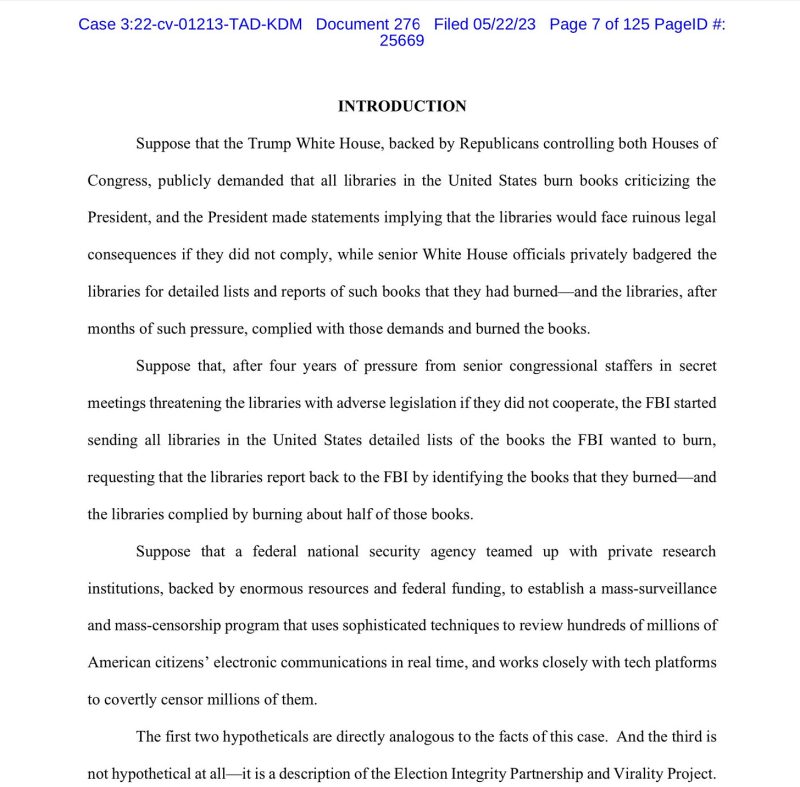

The defendants “Statement of Facts” is rife with “disinformation,” a term they have used as a guise to trample the 1st Amendment rights of Americans…


In the very first sentence of the brief the government filed to argue for why there should NOT be a temporary injunction halting their communication and threats to social media companies, they hide behind the “Foreign” assaults on critical election infrastructure. However evidence obtained in this case demonstrates that the Federal government overwhelmingly targets DOMESTIC speech by American citizens. Depositions and evidence obtained in the case prove that actors responsible for censorship admit that most of what they consider “misinformation” was DOMESTIC in nature, including from the Election Integrity Partnership (Keep the EIP front of mind).
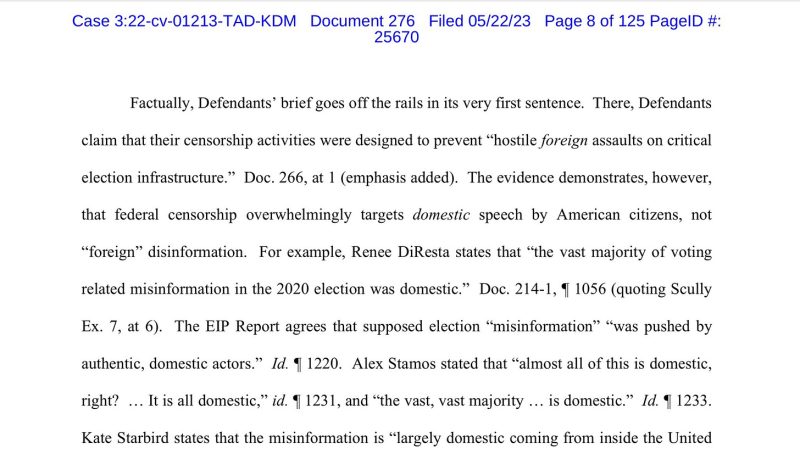

The Virality Project, the “medical bureaucracy” portion of the censorship apparatus, admits that for supposed covid misinformation, the majority of the “misinformation” came from domestic actors. An important thing to remember is this: Even though what many of us were saying about masks, the shot, covid origins, etc was TRUE, even if it WEREN’T, the government is forbidden from censoring. That important tenet aside, even when the FBI moved to censor “foreign” speech, it swept up hundreds of thousands of Americans and journalists—something we will explore further in a moment.
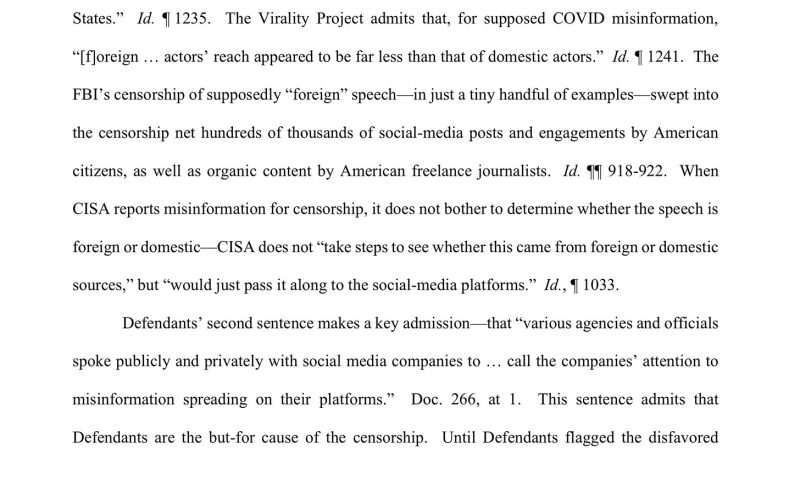

The government admits in their brief that they brought attention to posts they didn’t like on social media. And Plaintiffs made the argument that if not for the government taking an active role in flagging “wrong think” no action would have been taken—as more times than not this content DID NOT violate the social media companies’ terms of service. The government also claimed that all of these agencies worked independently of one another, that there wasn’t any coordination between them. As we will see, that is patently false. They didn’t all simultaneously just coincidentally decide to act to get social platforms to ban what they didn’t want you to see.


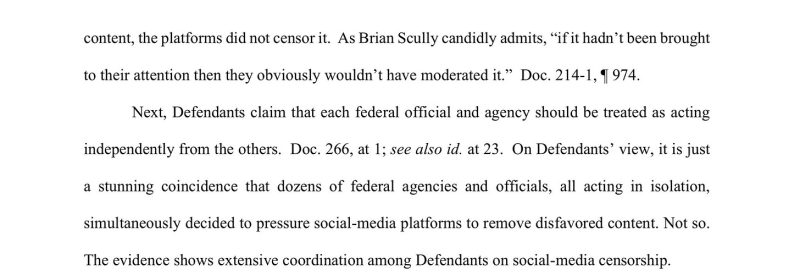

As the evidence proves, there was conspiracy behind the censorship. The White House campaign integrated with the Surgeon General, the CDC, and Census Bureau campaigns drew directly from White House pressure. NIAID and NIH censorship efforts draw from the CDC. CISA, FBI, DOJ, ODNI [Office of the Director of National Intelligence] and other agencies worked together and all participate in meetings together to facilitate pressure and censorship. CISA and the FBI worked together to censor the Biden laptop story. NIAID and NIH conspired together to censor the lab-leak theory and Great Barrington Declaration [co-authored by plaintiffs Bhattacharya and Kulldorff]. NIAID [Fauci’s former division at the NIH] is embedded in White House censorship activities. CISA and GEC [Global Engagement Center, the State Department’s censorship arm] coordinate with each other and with NGOs like the Election Integrity Partnership. This isn’t a guess. They have the evidence. This happened.
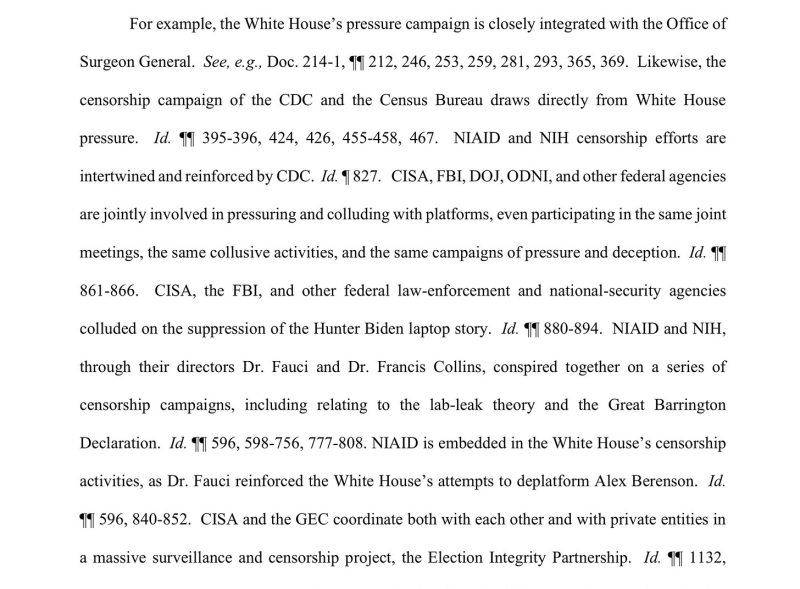

And if you thought it stopped with just executive agencies, you would be wrong. The Secretary of Homeland Security Himself describes the censorship apparatus as operating “across the federal enterprise.” High level congressional staffers coordinated with the FBI and social media in secret meetings. The partnership between the White House and Congress gives coercive force to the censorship activities, and there are documents to prove it. Jen Easterly, the director of CISA [the Cybersecurity Infrastructure Security Agency], texted that CISA wanted to play a “coordinated role” so that relevant agencies could try to “PREBUNK” (that’s a new one) and debunk trends of information, to prevent the “chaos” that would ensue if every agency was contacting platforms on their own.
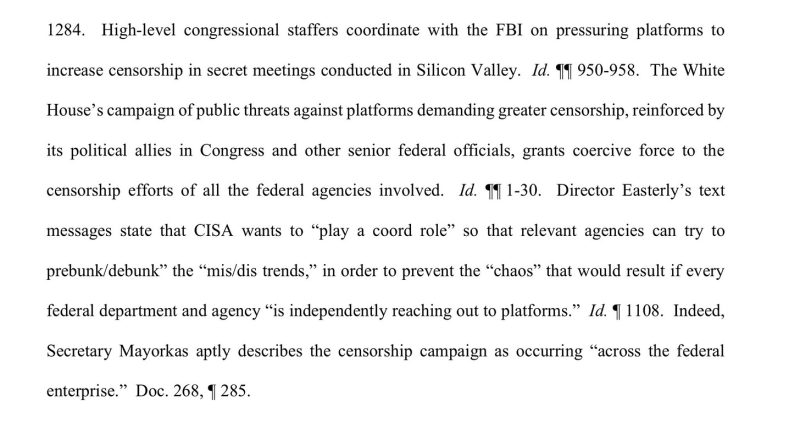

And that is what they did: CISA became the hub for many other government agencies to filter their censorship requests through—sort of a censorship “help desk” if you will. I argue that this was the reason they attempted to stand up to the “Disinformation Governance Board” several months back. They needed funding and an air of “official” to go along with their already clandestine activities. I also argue that this lawsuit is the reason they are attempting to ram through Congress the RESTRICT Act, or the misnamed “TikTok bill.” It is because they need Congress to approve their censorship actions here—this lawsuit is going to make it so the censorship regime can’t function.
The government argued, “But this happened before us!” It’s actually somewhat untrue. The Trump White House had no involvement in any of this—the bureaucracy was acting on its own. In fact, there was a secret text between [NIH Director] Collins and [NAIAID Director] Fauci where Collins stated the White House would disapprove of what they were doing, and Fauci assured him that they have “more important things to worry about.”
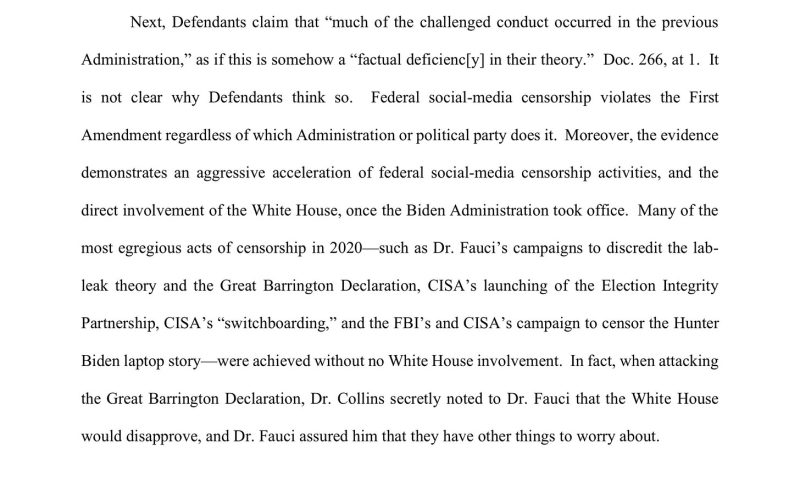

That’s all for now, folks, lest this email get too big for your inboxes. Stay tuned tomorrow for Part 2, where Tracy’s coverage of this week’s events in court will continue. In the meantime, you may want to follow Tracy if you are on Twitter and thank her for her excellent coverage of this case.
Republished from the author’s Substack
Join the conversation:


Published under a Creative Commons Attribution 4.0 International License
For reprints, please set the canonical link back to the original Brownstone Institute Article and Author.
